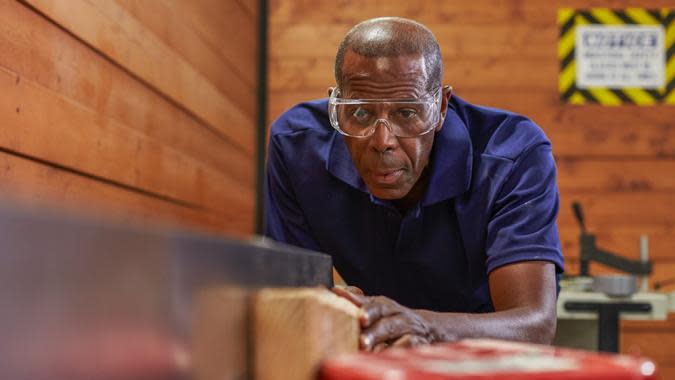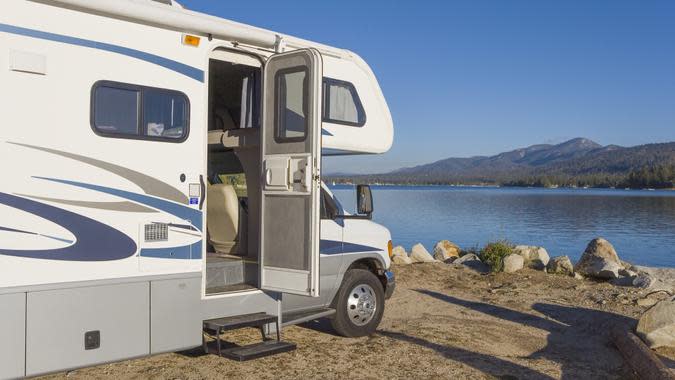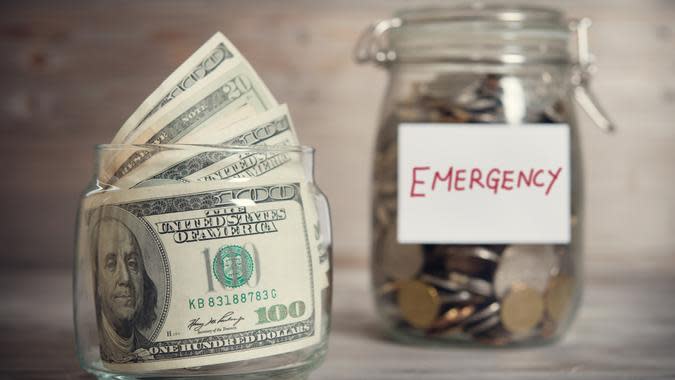Retirement isn’t the end of your financial journey. Though you may have called it quits on retirement planning, you’ll still have to understand how to save and spend money in retirement. This isn’t always easy, as you’re likely living on a fixed income.
For You: 8 States To Move to If You Don’t Want To Pay Taxes on Social Security
Explore More: 9 Easy Ways to Build Wealth That Will Last Through Retirement
Therefore, it can be frustrating that there’s no standard playbook dictating where retirees should put their money. However, a lack of one-size-fits-all advice is a positive.
It empowers you to choose from spending and saving options, shaping your retirement into exactly what you want it to be.


Start a Business or Side Gig
In retirement, you’ll have more free time to devote to your hobbies and passions. There might be no better time to invest in a side gig or part-time business.
Draft a business plan, speak to your local chamber of commerce or state licensing board and figure out how much it will cost to launch your new project. Whether you follow your dream for your fulfillment or to turn a profit, this could be a satisfying use of your retirement funds.
Consider This: Cutting Expenses for Retirement? Here’s the No. 1 Thing To Get Rid Of First
Try This: 7 Things You’ll Be Happy You Downgraded in Retirement
Earning passive income doesn’t need to be difficult. You can start this week.


Donate to Charities
When you retire, you might not have as many expenses as when you were working. Your mortgage and cars might be paid off, and your kids will likely be on their own.
If you find yourself with excess cash, consider increasing your contributions to your favorite charity. In addition to getting a possible tax break, you’ll be using your golden years to help out others in need.
Find Out: 2 Changes Are Coming to Social Security in 2025


Continue to Regularly Invest
Just because you’re retired doesn’t mean that you should stop investing. For one thing, retirement might last a lot longer than you imagine.
As of 2024, the Centers for Disease Control and Prevention estimates life expectancy at 77.5 years old. If you were to retire at the early retirement age of 62, the estimated life expectancy leaves you with over 15 years of expenses without regular work.
That’s a long time to stretch out your money, and it could be even longer. Keeping your funds invested — and contributing more — can help ensure that you won’t outlive your money.


Open Accounts or College Funds for Grandchildren
If you feel like your retirement is set and you don’t need to sock away more money for yourself, how about starting some investments for those you love?
You can open regular investment accounts for your children, grandchildren or other relatives, or you can open specialized educational accounts such as a 529 plan. An added benefit of a 529 plan is that you can change your beneficiary at any time — even making yourself the beneficiary.


Delay Social Security
Though not a place to “put” your money, delaying Social Security is an excellent example of what you can “do” with your money.
If you were born in 1943 or later, every year that you can defer taking Social Security increases those payments by up to 8%, up until age 70.
In essence, you’re getting a guaranteed return on your Social Security “investment” every year that you wait, and that’s a return that can be tough to beat.


Contribute To a Roth IRA
One clever option for saving in retirement is to contribute to a Roth IRA. The traditional “downside” of a Roth IRA is that you don’t get a tax deduction on your contributions.
However, as a retiree, you’re likely in a lower tax bracket than when you were working; thus, getting a tax deduction on your contributions is not as important. Plus, with a Roth IRA, there is no age limit on contributions, unlike with a traditional IRA.
Check Out: I’m an Economist: Here’s My Prediction for Social Security If Trump Wins the 2024 Election


Improve Your Quality of Life
Certain things get harder as you age; it’s just the way it is. When you’re retired, your quality of life can be greatly improved if you spend some money on modern conveniences.
If you need help hiking a mountain, invest in a good knee brace; if you can’t get in and out of the car quite as easily as you used to, invest in a door handle or other tool that can give you leverage.


Invest in Yourself
One of the best investments you can make at any time of your life is in yourself. This doesn’t change after retirement; in fact, many doctors suggest that retirees continually challenge themselves mentally to stave off the deterioration that sometimes accompanies old age.
Invest in a good online course on a topic that interests you, or better yet, invest in an on-site course that requires you to interact socially with other students of all ages.


Buy a Fixed Annuity
A fixed annuity is another way to ensure that you don’t outlive your savings. When you buy a fixed annuity, your lump sum of cash is turned into a lifetime stream of income, no matter how long you live.
With life expectancy getting longer and longer, more than 30 years of retirement is no longer unheard of.


Pay Off Your Mortgage
If you’re looking at where to put your cash when you retire, consider paying off your mortgage. By the time you retire, the remaining balance on your home might be small enough to pay off in a single lump sum.
Then, you can enjoy the remaining years of your life without having to worry about a mortgage or rent payment. This can free up your funds for other activities, or at the very least, give you peace of mind that you will always have a place to stay for free.
Learn More: Trump Wants To Eliminate Social Security Taxes: Here’s How Much the Average Retiree Would Save


Buy a Motor Home or RV
When discussing retirement planning, many advisors suggest that retirees downsize, as single-family homes are often too large and require too much upkeep for a retired couple. One option is to get rid of your home altogether and buy a motor home or RV.
With a smaller, mobile space, you won’t have to worry about property taxes and large property maintenance bills, and you can travel to friends and family and visit places you’ve always wanted to see.


Buy Rental Properties
In addition to — or instead of — paying off your mortgage, investing in real estate can be a good move for retirees. If you buy rental properties, you can generate passive income every year from your renters. Additionally, the value of the property you buy might grow in value as well.
Another option is to invest in transforming one of the rooms of your existing house into an Airbnb or other rental property, thereby generating income on an asset you already own.


Invest in Step-Up CDs
A step-up CD allows you to raise the interest rate on your investment to the then-current rate. Although many step-up CDs grant this privilege once during the original CD term, some have multiple step-up options.
These types of CDs can be great investments for retirees, as they not only take advantage of rising interest rates but are also FDIC-insured.


Buy TIPS
Inflation can be the worst enemy of a retiree. Inflation reflects rising prices for goods and services, from groceries and gas to the price of entertainment. As many retirees are on a fixed income, rising costs make that money less valuable.
A Treasury Inflation-Protected Security can combat the rising prices brought on by inflation, and it’s backed by the full faith and credit of the U.S. government.
Trending Now: 2 Things Empty Nesters Should Stop Investing In To Boost Retirement Savings


Add To Your Emergency Fund
When you’re retired, life still goes on. Surprises still come up. You still need to contribute to an emergency fund to have a cushion to pay those expenses.
In fact, in retirement, an emergency fund is even more important, since you won’t generally have as large of an income to cover unexpected costs.


Buy Income-Producing Investments
As a retiree, you’ll no longer have a regular monthly income from a job. To replace this income, consider investing at least a portion of your money into income-producing stocks, mutual funds, exchange-traded funds or bonds.
Each of these types of investments has its own risk/reward profile, and you’ll likely want to consult a financial advisor to choose the right instruments.
However, some combination of income-producing investments can help replace your lost employment income while you’re retired.


Invest In a Variable Annuity With a Guaranteed Income Rider
A variable annuity with a guaranteed income rider is another investment option for retirees looking for both income and growth.
Also known as a guaranteed minimum income benefit, these types of annuities offer the potential for market growth but still guarantee that investors will receive at least a minimum amount of income.
This type of hybrid investment can make sense for retirement-age investors who can’t risk their entire portfolios in the equity market.


Purchase Equity-Linked CDs
An equity-linked CD is a guaranteed product that will give you a basic CD return plus a kicker based on the performance of the equity markets.
Though there’s no guarantee that you’ll earn a huge return, your downside is limited, as you’re always guaranteed to at least get back the amount of your investment.
This can be a good option for retirees who want a chance at a return higher than a straight CD can offer while still protecting their principal.
Read More: The Average Retirement Age in 2024: US vs. China


Keep Money in Your 401(k) as Long as You Can
Though not all employers will allow this, keeping your money in your old employer’s 401(k) plan as long as possible can be a great strategy for retirees.
For starters, your money will remain in its tax-deferred wrapper. Even better, you’ll still have access to all of the 401(k) options of your former employer.
Assuming you were in a good plan, this can be a lot less stressful and more convenient than having to roll over your 401(k) plan into an IRA and start your whole investment program from scratch.


Make an Estate Plan
To simplify life for your heirs, hire a good estate planning lawyer to draft whatever end-of-life documents are appropriate for your situation. Though some households will only require a will, many others are better served with a trust or comprehensive estate plan.
Not only will this ensure that your money goes where you want it to upon your death, but you can also prepare for other possible contingencies, such as if you become incapacitated.


Invest In a Garden
One of the best ways to invest in yourself and to help keep you powered through retirement is to eat healthy food. If you create and maintain your garden, not only are you getting farm-fresh products, but you’re keeping your mind occupied with a hobby that many people enjoy.
Plus, your garden investment is likely to pay off over time, as your vegetables will be much more inexpensive than those you can get from a grocery store.


Prepay Funeral Expenses
No one likes to think of their own mortality, but if you prepay your funeral expenses, you’ll solve a number of potential problems.
For starters, you know that you’ll get exactly what you want when it comes to your funeral and burial or cremation. An additional benefit is that you’ll take a bit of the burden off of your heirs during what is bound to be a difficult time.
Check Out: Trump Wants To Eliminate Social Security Taxes: Here’s How Much the Average Retiree Would Save


Remodel or Upgrade Your Home
Remodeling your home won’t necessarily increase its value — in fact, some renovations are known money losers. So why spend money in retirement on a remodel? At this point in life, it’s time to enjoy the fruits of your labor.
Upgrade your home with something you’ll enjoy, whether that’s a private movie room or a new luxurious bathroom.


Upgrade to Energy-Efficient Appliances
As a retiree, you can expect to be home more than when you were working. The more time you spend at home, the higher you can expect your utility bill to be.
To combat this, consider upgrading your appliances to energy-efficient ones. This can result in big savings, especially if you’ve had the same appliances for 10, 20 or even 30 years.


Buy a Bigger TV
A bigger TV might be a waste of money for some, but if you’re retired, it can help your quality of life in a few ways. For starters, a bigger screen makes it easier to read numbers and small figures, which can get harder to do as you age.
A bigger TV might also significantly broaden your entertainment universe, particularly if you get a Roku TV that offers access to numerous additional channels and services, some of which are free.
Finally, a new TV might be more energy-efficient than your old one.


Join AARP
Joining the AARP, formerly known as the American Association of Retired Persons, only costs $16 per year but opens up a world of discounts and benefits to people aged 50 or older.
You can get cheaper movie tickets, car rentals, dental insurance and other products and services just by being a member, making that small investment a smart thing to do with your money when you retire.
Explore More: The Average Retirement Age in 2024: US vs. Italy


Travel
Many retirees have accumulated a lifetime of possessions. But as the old saying goes, “You can’t take it with you.”
Once it’s safe to start traveling again, you can start to accumulate memories and experiences rather than possessions.
Spending that travel time with friends and family can build and strengthen bonds as well, providing a fulfilling retirement.
More From GOBankingRates
This article originally appeared on GOBankingRates.com: 27 Things Retirees Should Do With Their Money Right Now
